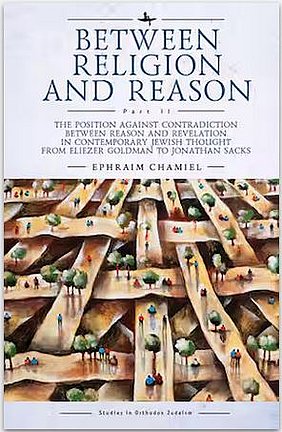Between Religion and Reason (Parts I and II) are sequels to Ephraim Chamiel’s two previous studies devoted to a middle path in resolving the conflict between Orthodox Judaism and modernity―that is, in terms of Jewish thought and behavior, the notable conflict between tradition and modernity, religion and science, and revelation and reason.
Translated from the Hebrew original text, Between Religion and Reason (Part I),: The Dialectical Position in Contemporary Jewish Thought from Rav Kook to Rav Shagar, explores two schools of contemporary Jewish thinkers who have adopted the dialectical approach. One group maintains that the rift within human consciousness between rational intellect and spiritual emotion can be mended. The other group contends that the practice of arriving at the is near impossible between religious absolutism and scientific thinking and theory.
Between Religion and Reason (Part II): The Position against Contradiction between Reason and Revelation in Contemporary Jewish Thought from Eliezer Goldman to Jonathan Sacks, entertains competing approaches to revelation and reason, which are parsed into full identicality or restrictive identicality approaches. Full identicality sees no major divide nor contradiction between revelation and scientific and philosophical deduction as comprehended by the human mind. Sa’adyah Gaon (882-942) is cited as the originator of this point of view. Restrictive identicality maintains that revelation and reason are identical in principle but conflict and contradiction set in when the scientific, ethical, and philosophic discussions/conceptions overreached their limit; they are based on an assumed hypothesis, not on factual evidence or truth. In these situations, religionists turn to knowledge based on strict revelation whose divine source is faultless and cannot be disputed. R. Judah Halevi, Hasdai Crescas, and Philo are identified with this position. The modern period saw a shift in the full vs. restrictive identicality debate. When science had issues constructing a firm platform for its hypotheses and conclusions, religionists saw triumphalism in God’s revelation expressed in the TaNaKh (Hebrew Bible) and viewed it as direct teaching to all humanity.
However, from the 17th to the 19th century, biblical criticism made its impact and science restored its respectability by succeeding in proving major findings to be true beyond doubt. What emerged is a neo-fundamentalist identicality approach, which acknowledged that the biblical text is not always consistent, but it is inerrant in “the areas of theology and morality or in physical, geological, or historical facts” (3). The leading 19th-century thinker of this approach is Rabbi Samson Raphael Hirsch. In addition, there is the interpretative identicality approach, which views revelation and science to be united in principle, and holds that contradictions arise from misunderstanding the meaning of revelatory statements and principles. If “meaning” comprises language, then straightforward readings of a biblical text would be compounded by their symbolic, allegorical, philosophical, mystical, and non-literal meanings.
Finally, there are two positions which do not emerge from the contradictions and conflicts between revelation and science. The compartmental approach and transcendental approach both see revelation and reason to be separate entities (either partially or totally) of a single greater truth. The two sources focus on different realms and speak in different tongues, and though some interaction between the two is possible, it is impossible for one to question the other. The religious realm is beyond material reality and human comprehension, and reason is totally restricted to what humans can comprehend, i.e., the world of appearances. Moses Mendelssohn, Franz Rosenzweig, and Yeshayahu Leibowitz are cited as luminaries of the compartmental approach, and Immanuel Kant is the source of the transcendental approach, which is identified with Isaac Breuer and R. Shagar.
The pedagogic issue of agreement and disagreement between approaches of revelation and reason are highlighted in the book’s chapters on Eliezer Goldman, Norman Lamm, Aharon Lichtenstein, and Jonathan Sacks. In dissecting the thought of these thinkers, the aforementioned approaches shine forth in showing how (1) it is possible to resolve all conflicting issues and problems between religion and science, religious ethics/law/morality and Western mores, and traditional study and contemporary scholarship; and (2) it is not possible to resolve the absolute differences in thought and practice between Torah/Revelation and Mada`/Science and so it is necessary to live in and by both.
Chamiel’s offers in-depth, often opinionated comparative analysis. His chapter on Norman Lamm (emeritus president of Yeshiva University whose seal is Torah U-Mada`) is an example. Heavy reason aside, the mystically oriented Rabbi Abraham Isaac Kook (1865-1935), first Ashkenazi Chief Rabbi of British Mandatory Palestine, cited by Chamiel a number of times, beautifully expressed the rationality of the God doctrine within Jewish thought:
“God is only revealed within religion to the extent that religion is shaped by that which is beyond religion. Religion is the proper name used by every people and language, but not so for Israel. A living Torah is not defined by religion. Our living Torah is a revelation of God. God is revealed within it just as God is revealed within all of existence. The Torah and existence, when they are joined together, reveal the living God within the soul of the individual and collective. The holy and the profane are only separate from the perspective of religion. Religion places guards upon matters of holiness and ignores profane concerns. The concept of religion is subordinate to this idea. God is revealed within everything, both within the holy and within the profane.” (Hebrew cited in R. Kook’s private notebooks and published in the last few years)
I suspect that the author’s personal orthodoxy agrees.


